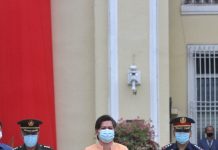by Lovely A. Carillo
Davao City’s Anti-Spitting Ordinance elicited a lot of laughs when it was first introduced in the session hall of the City Council. “Such a trivial resolution,” someone in the gallery commented.
However, there is more to the Anti-Spitting Ordinance than what is perceived by the public. For one, the ordinance seeks to promote not only cleanliness in the streets of the city, but also seeks to protect people’s health.
“We have cases of drug-resistant tuberculosis; these are patients whot do not respond to medicine even after six months of treatment,” Davao City National Tuberculosis Program medical coordinator Dr. Ashley Lopez said.
TB cases in Davao City, which has increased from 1,568 in 2008 to 1,617 in 2009, is considered to be the highest in the region.
“Tuberculosis is still considered one of the killer diseases in the country despite advancements made by science in terms of providing treatment for this medical condition,” City Council committee on health chair Dr. Samuel Bangoy said.
The Anti-Spitting Ordinance provides that “no person or persons shall carelessly or intentionally spit saliva, phlegm, mucus, or other substances from the mouth in the city streets, alleys, sidewalks, parks, malls, markets, streets, public carriers, public halls, and buildings, banks, public squares, terminals, shopping and business centers, schools, churches, hospitals, and other similar public places within the City of Davao.”
Spitting has been identified as one of the factors in the spread of TB in the city, considering that mycobacterism, the bacteria that causes most TB, is airborne and can survive for up to eight months in dried state.
The proper way to spit, Lopez said, is to use tissue paper which is disposed of properly. Bangoy said disallowing Dabawenyos from spitting in public will help the city in its campaign to stop the spread of TB and other diseases.
Lopez said a closer look at countries with zero cases of TB shows that these are the countries with very strict laws against spitting in public. Singapore, one of the countries that have an anti-spitting laws, has experienced a steady decline in TB cases from 1,712 in 1997 to 1,256 in 2006.
Violators of Davao City’s Anti-Spitting Ordinance will be made to pay a fine of P100 for the first offense, P200 for the second offense and P300 fine or subsidiary imprisonment of not more than six months for the third offense, or both, depending on the discretion of the court.
Among the symptoms of TB are blood-stained sputum, coughing for two weeks, shortness of breath chest pains, back pains, fever, chills, night sweating, poor appetite, weight loss, general feeling of tiredness and illness.
This is another landmark ordinance for the city, in addition to the anti-smoking ordinance enacted in 2002 and the firecracker ban in the same year.






